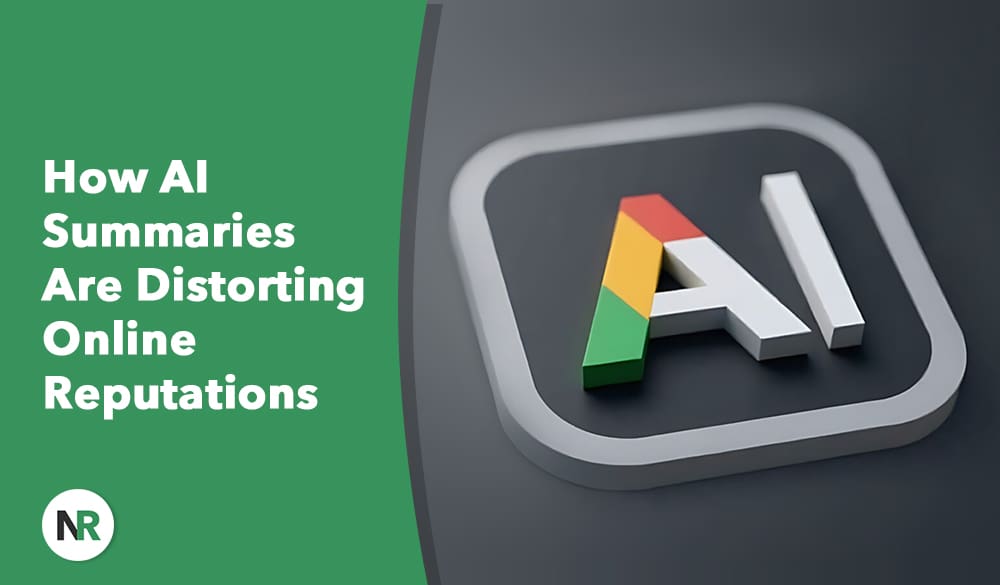AI summaries are everywhere. From news articles to research papers, generative AI tools now summarize text faster than any human could. But with convenience comes risk. As these summarizing tools shape how people perceive brands, businesses, and individuals online, a single distorted summary can alter reputations—sometimes permanently.
What Are AI Summaries?
AI summaries are short, machine-generated versions of longer content. Using machine learning and natural language processing, a summarizing tool scans the original text—such as news articles, essays, or transcripts—and extracts key points to generate a concise version.
Common types of AI summaries include:
- Extractive summaries, which pull key sentences from the text
- Abstractive summaries, which rewrite content using an AI’s language model
You’ll find AI summaries built into tools like ChatGPT, Google’s article summarizer, and other text summarizer apps that work across multiple languages. These tools are often used to reduce reading time, condense lengthy text, and help readers quickly grasp the main points.
How Do Summarizing Tools Work?
An AI summarizer tool typically involves:
- Input box: You paste or upload the original text, file, or article
- AI model: The engine analyzes paragraphs, tone, and structure
- Output: It generates a summary using key terms, bullet points, or short paragraphs
These tools are trained on massive datasets of articles, documents, and transcripts, and they learn to identify patterns, key sentences, and structural cues.
While a good summarizing tool can be a powerful assistant for students, professionals, and businesses, these summaries are not always accurate.
Where AI Summaries Go Wrong
AI summaries can distort reputations when they:
1. Lose Original Context
Summaries often omit nuance. When summarizing sensitive business topics or complex technical discussions, the AI may misrepresent a company’s intent. A misunderstood sentence from a press release or research paper could become the only quote a customer sees.
2. Favor Speed Over Accuracy
To reduce reading time, summarizer tools often cut down valuable context. While this may help students skim content, it risks sacrificing accuracy when summarizing a company’s announcement or a crisis response.
3. Include or Exclude the Wrong Sentences
Extractive summarization may latch onto the most provocative or misleading sentences, resulting in an unbalanced summary that fails to accurately reflect the main points of the original article.
4. Struggle with Tone and Intent
AI often lacks the emotional intelligence to understand sarcasm, humor, or implied meanings, resulting in summaries that feel off or even offensive when extracted from essays or opinion articles.
Get started with your free reputation evaluation today
Real-World Examples of Distortion
- A brand spokesperson issues a 500-word statement clarifying a product issue. An AI summary selects one sentence about “regret” and omits the rest, resulting in headlines that overstate the problem.
- A small business publishes a positive customer story. The summarizer tool reduces it to two dry bullet points, missing the emotional impact.
- A news article about a startup includes a joke about the challenges of securing funding. AI pulls that as the key sentence, making the business appear unstable.
The Risks for Businesses
- Reputation Damage: A single negative review can rank high on Google and spread rapidly on social media.
- Misinformation: A distorted summary of a research paper or technical article may lead to incorrect reporting.
- Legal Issues: Misquotes generated by AI could raise concerns about plagiarism or libel.
- Customer Confusion: When a summary misrepresents a policy or product, trust is eroded.
How to Spot a Distorted Summary
Look out for:
- Oversimplified sentences that lack nuance
- Missing key paragraphs or contradictory claims
- Summaries that don’t match the original text
- Format errors or misleading bullet points
Always read the full article, especially before sharing, quoting, or reacting to an AI-generated summary.
Tips for Protecting Your Online Reputation
1. Review Summaries of Your Content
Use popular summarizing tools to see how your articles, statements, or documents are being shortened—spot potential red flags.
2. Adjust Summary Length When Possible
If you control the tool, select a longer summary length to preserve more context.
3. Use AI Tools With Oversight
Use a summarizer tool for first drafts, but have a human editor review the output, especially for business or public-facing use.
4. Pre-Summarize Critical Content
Include a human-written summary at the top of important content. This provides summarizing tools with a better format to draw from and protects your intended message.
5. Monitor Your Mentions
Use alerts and listening tools to catch when a distorted AI summary is circulating, so you can respond with corrections.
Ethical Concerns
- Bias: AI may prioritize inflammatory or controversial language.
- Transparency: Readers often don’t realize they’re reading an AI-generated summary.
- Plagiarism: Summary generators may repurpose others’ work without citation.
Businesses should use AI summarizers responsibly and disclose when content has been generated or modified using these tools.
Can AI Summaries Be Improved?
Yes. Here’s how:
- Train models on diverse, high-quality data to reduce bias
- Refine algorithms to preserve the original context
- Improve UX so users can adjust summary length and output style
- Include citations in AI-generated summaries for transparency
As AI tools evolve, summarizing engines must prioritize trust, accuracy, and fairness, especially when public perception is at stake.
Final Thoughts
AI summaries are a powerful tool, but also a risk. When they misrepresent people or businesses, the consequences can be serious. In an era of short attention spans and rapid content, a faulty summary generator can tarnish a reputation in seconds.
When using AI to summarize text, ensure you remain in control. Don’t let your message be reduced to the wrong key points.
